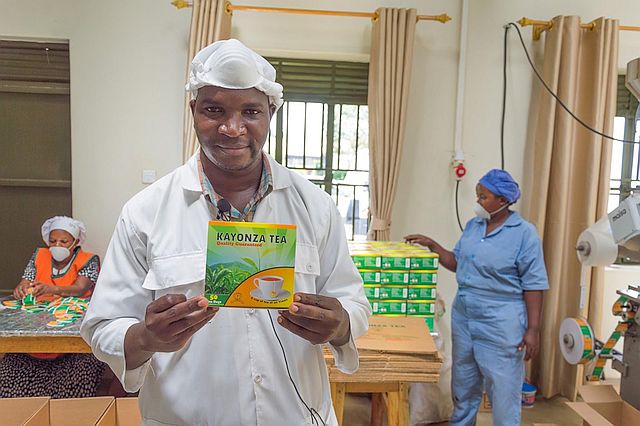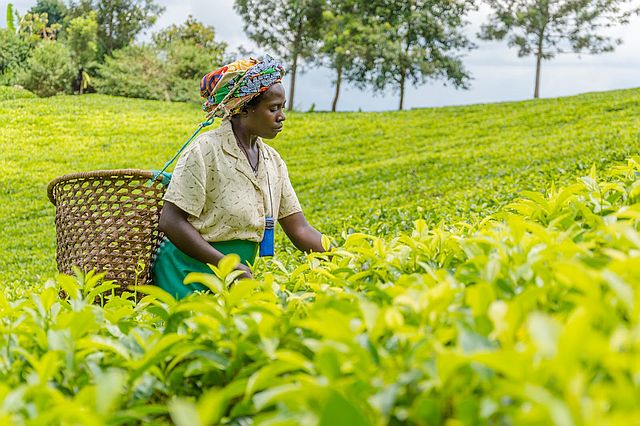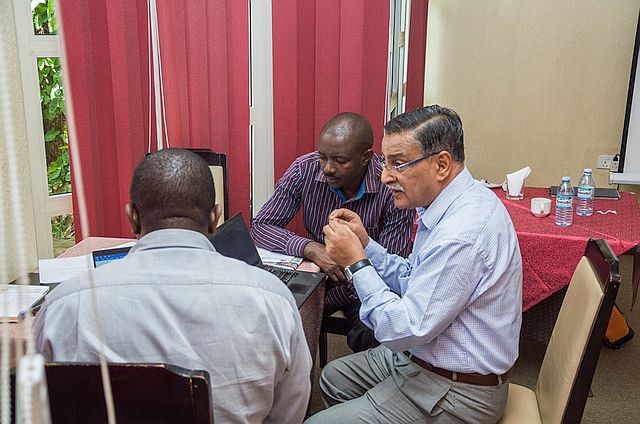Growing their tea on the edge of pristine rainforest in south-western Uganda, Kayonza’s suppliers are committed to delivering the leaves to the factory. In return, the factory pays them a fair price. It’s an example of forward integration in the supply chain.

Kayonza sells its own brand for the domestic market, but most of the tea is exported
A virtuous circle of growth
The tea factory won the UNDP Equator Prize in 2015 for its dedication to the community and its environmentally friendly methods. Thanks to subsequent support from the UNDP, its growers adopted better farm practices.
As a result, the factory consistently began working at capacity to process the resulting higher yields. Expansion seemed a feasible option and Kayonza found a potential site in Mpungu, a village 40 kilometres from the main plant.
However, was a second plant really needed? Or would improvements to the original factory be enough? The UNDP brought in Solidaridad’s dedicated Impact Investment Task Force to assess the situation.
Positive impact on farmers
It was clear that Kayonza’s 7,000+ smallholder growers would benefit from the expansion in several ways:
-
they are all shareholders in the factory and thrive if it is thriving
-
they could sell even greater volumes of tea to the factory
-
farmers near the new factory would earn premiums because their tea would be very fresh – they would no longer need to transport it to the main plant
-
the government would commit to better infrastructure for the new factory’s community
-
an estimated 220 jobs at the factory for local people.
Knowing it would be a key consideration for potential investors, Solidaridad highlighted Kayonza’s social impact in the business plan: most of its suppliers live below the poverty line and the factory has a proven policy of including women and youth in its workforce.

Hand-harvesting the leaves
…and on the environment
Investors were also pleased to see Kayonza has proven sustainability/resilience in the face of climate change as part of its policies, as demonstrated by winning Equator prize and gaining Rainforest Alliance and Utz certification.
With the support of Solidaridad, Kayonza had an Environmental Impact Assessment done in 2018. They were able to address all environmental concerns, including:
-
the protection of nearby Bwindi impenetrable national park, home to Uganda’s mountain gorillas
-
thought-out policy for water use and recycling
-
sustainable management of fuel wood, the area’s only practicable fuel
Strong management, a solid business plan and a long track record
Solidaridad succeeded in creating a strong relationship with factory management. Some of the figures were not in order initially, but thanks to the built-up trust, they worked together to provide potential investors with a transparent and trustworthy financial overview. It then helped Kayonza create a solid business plan around it. This plan provided a clear assessment of the supply shed, together with different financial scenarios taking risks into account.
|
|
|
Supply and profit-and-loss projections prepared for Kayonza’s new plant in Mpungu
The business plan showed that Kayonza has experienced management that can handle a large, long-term loan. The factory has a long track record, having been operating for over 50 years. With all of these factors demonstrated, the factory had a strong investment proposal.
Dovetailing interests of management and investors
Rakula Okoth of Solidaridad’s Impact Investment Task Force in East and Central Africa harmonized the different priorities of factory management and potential investors.
Okoth and other members of Solidadaridad’s Impact Investment Task Force now brought it before potential impact investors, organising field visits and dialogues with Kayonza’s management, and several parties showed their interest.
Kayonza and Oikocredit: an excellent match
A successful candidate – Oikocredit – eventually emerged. Once its own due diligence was complete, the Dutch NGO and Kayonza signed the deal on 1 September 2019. The long-term loan of 3.15 million dollars means the Mpungu plant can go ahead, doubling capacity.
Post investment, the work goes on
Following the signing, Kayonza management worked closely with Solidaridad to establish a plan to have more women included in management and in the field. They are now working with UK-based NGO Producers Direct to engage more women extension officers, improve representation of women leaders, and meet the needs of female farmers, including a loan product.
It is clear from the Kayonza case that Solidaridad can add value to impact investment projects beyond the disbursement of the funds. It has a role to play by providing technical assistance and monitoring the evolution of investees as they work to close any knowledge gaps. Particularly in areas like environmental impact, landscape management and gender issues.
Why supporting businesses like Kayonza matters
Solidaridad acted as a link for different areas of internal and external knowledge, including its own experts, the UNDP and other NGOs.
For instance, it brought in Boriah Gangan, a tea expert from Solidaridad India. Duplication of equipment and processes from the original plant to new factory made it easier to calculate projections and to demonstrate the factory has in-house skills to train new workers.

Boriah Gangan (right), tea expert with Solidaridad India, talking with members of Kayonza management during his scoping visit to the factory
Four key ways Solidaridad makes a difference in impact investing
Solidaridad is working to find impact investors for many more projects improving livelihoods of smallholder farmers. It is building relationships with a wide range of inter
national organizations, both at their headquarters and in their regional offices.
Looking back at its work with Kayonza, there are four stand-out ways Solidaridad adds value for impact investment projects:
-
The ability to source experts from elsewhere in Solidaridad’s network speeds results
-
Knowing investors’ must-haves and nice-to-haves and communicating these to factory management eases communication
-
Awareness of realistic timeframes, especially when dealing with extra layers of bureaucracy because of government involvement, helps educate investors and investees
-
Collaborating with like-minded organizations like Solidaridad and UNDP offers investors a sense of security.
Decades of innovation experience
Solidaridad established the foundations of fair trade in the 1980s, created successful companies such as Agrofair in the early 2000s, and have attracted patient capital to finance the growth of game-changers across the agricultural sector through to today.
With eight regional offices across four continents, it has boots on the ground, is rooted in local knowledge, and has a deep understanding of global political and market forces. At the same time, it understands the context in which smallholder businesses operate and what it takes to make them successful.
Seeking more investors aiming for meaningful impact
Solidaridad provides impact investors with a pipeline of solutions to create meaningful impact across the agricultural sector. Through this investment, it supports farmers, buyers, processors and service providers to become entrepreneurs of self-sustaining businesses.
Its goal is to ensure farmers’ businesses are embedded in, and supported by, a business ecosystem that can provide services to farmers and a market for their products. In this way, supporting Kayonza in getting access to finance fits seamlessly with Solidaridad’s mission.
>Read more about Solidaridad’s work in impact investing
